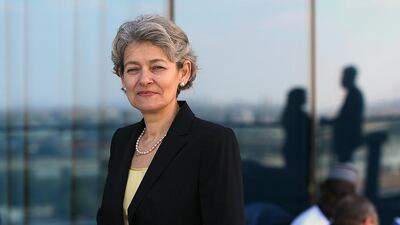ABU DHABI // Protecting the world’s cultural heritage involves not only preventing ancient monuments from being bulldozed by extremists or treasures looted by thieves, it means preserving a people’s identity and promoting peace, experts said.
“Can you imagine a world where people can destroy a mosque, church, synagogue, or any structure. When attacks happen, we all suffer,” said Irina Bokova, head of Unesco, ahead of a major cultural heritage conference taking place in Abu Dhabi this weekend.
The rise of extremisim and conflicts around the world that target ethnic minorities and religions can be seen as a form of what Ms Bokova referred to as cultural cleansing.
“We want cultural heritage to be on the global political agenda. I insist on the word political because I do believe the protection of culture and heritage is part of the security agenda nowadays,” she said.
At the Abu Dhabi conference, Unesco aims to promote discussion on the importance of safeguarding cultural heritage in the hope world leaders will reinforce efforts to protect cultural sites in times of conflict.
Protecting these artefacts and antiquities requires collaboration between the state and authorities, backed by laws, Ms Bokova said.
“Heritage is the best way for dialogue among cultures and it gives confidence to people to rebuild,” she said. In 2014, ISIL and other extremist groups destroyed 28 cultural heritage sites including Hatra, one of the first Arab cities, a 13th-century religious shrine that survived the Mongol invasion, and mausoleums in Timbuktu.
The two-day conference will host several heads of state including Sheikh Sabah Al Ahmad Al Sabah, emir of Kuwait, Sheikh Tamim bin Hamad Al Thani, emir of Qatar, Mohammed Abdel Fattah El Sisi, president of Egypt and Francois Hollande, president of France, among others.
“The continuing devastation of these treasures deprives us, and future generations, of a -resource that is of enormous historical value,” said Mohammed Al Mubarak, chairman of the Abu Dhabi Tourism & Culture Authority.
He said that the deliberate destruction of cultural artefacts as an act of war reflected not only their symbolic importance to a nation’s collective consciousness, but also underscored the urgent need to protect them.
“Safeguarding heritage often becomes secondary to humanitarian, social and economic issues in times of unforeseen conflict. Yet it is our duty to come together and strive for the protection and perpetuation of this heritage,” he said.
Demand from wealthy collectors has created an illicit trade in antiquities, an issue that will be discussed during the event.
Ms Bokova said trafficking antiquities was at the heart of border protection issues. From the lowly collector to museums, the framework of who owns cultural artefacts needed to be addressed, she said.
The two-day conference will conclude with the ratification and adoption of the Abu Dhabi Declaration.
___________________________________________________________
The attendees
• Sheikh Mohammed bin Zayed, Crown Prince of Abu Dhabi and Deputy Supreme Commander of the Armed Forces
• Sheikh Sabah Al Ahmad Al Sabah, emir of Kuwait
• Sheikh Tamim bin Hamad Al Thani, emir of Qatar
• Abdel Fattah El Sisi, president of Egypt
• Francois Hollande, president of France
• Ibrahim Keita, president of Mali
• Ashraf Ghani, president of Afghanistan
• Irina Bokova, director-general, Unesco
• Fayez Al Sarraj, prime minister of the Government of National Accord of Libya
• Denis Zvizdi, chairman of the council of ministers of Bosnia and Herzegovina
• Alexis Tsipras, prime minister of Greece
• Hailemariam Desalegn, prime minister of Ethiopia
• Emir Khalid Al Faisal, governor, Makkah province, Saudi Arabia
• Haitham bin Tariq bin Al Busaid, minister of heritage and culture, Oman
• Sheikh Nasser bin Hamad Al Khalifa, son of the king of Bahrain
• Mohammed Al Mubarak, chairman, Abu Dhabi Tourism and Culture Authority
• Saif Ghobash, director general, Abu Dhabi Tourism and Culture Authority
• Azedine Beschaouch, former Tunisia minister of culture
• Tom Campbell, director of the Metropolitan Museum of Art
• Anne-Marie Afeiche, director of the Museum of Beirut
• Jean-Luc Martinez, president and director of the Louvre museum
nalwasmi@thenational.ae

